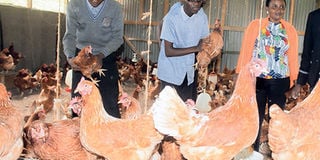An egg every week keeps school happy

Makueni Boys High School students together with their teacher, Rosalina Kyalo, inspect chicken that they keep in the school. From the birds, the school collects 10 trays of eggs daily, which translates to 700 trays a week. PHOTO | PIUS MAUNDU | NMG
What you need to know:
- The institution bought 1,200 birds towards the end of last year and housed them in a makeshift shed made from timber and iron sheets, and used blankets.
- The students fall over each other in assisting the groundsman with the collection of eggs and their grading as well as feeding the birds. This happens at least thrice a week.
- The deputy dining hall captain Ramadhan Laki Hassan, who campaigned on the promise, says that the proposal is realistic because the chicken project is yielding excess eggs.
- Teachers and non-teaching staff form another big market for eggs from the school layers. They buy the eggs at discounted rate of Sh300 per tray.
An ‘odd’ debate made it to this year’s student council politics at Makueni Boys High School, which wound the process two weeks ago.
Some of the students who contested for various leadership positions at the council promised in their campaigns to increase to two per week the number of eggs the school serves the learners.
And they had a good reason for it. A chicken project at the school where students occasionally perform light duties has been yielding more eggs than the populous national school needs.
The institution bought 1,200 birds towards the end of last year and housed them in a makeshift shed made from timber and iron sheets, and used blankets.
The project cost Sh577,000 to set up. “Sh286,000 went to setting up the premises and Sh291,000 on buying the 1,200 birds (500 layers and 700 broilers) and feeds,” Raphael Diwani, the school principal, tells Seeds of Gold.
A worker at the school, who was trained by Kenchic on handling chickens, runs the facility which is frequented by students taking agriculture.
The students fall over each other in assisting the groundsman with the collection of eggs and their grading as well as feeding the birds. This happens at least thrice a week.
“The project helps our students to appreciate what they learn in class on chicken rearing and farming in general. This has increased the student’s interest in the subject,” Rosalina Kyalo, the Form Four agriculture teacher, says.
LABOUR INTENSIVE
The school collects 10 trays of eggs daily, which translates to 700 trays a week. The school only needs 44 trays
“Each student eats an egg per week. Understandably, the students want the eggs they eat increased that is why those who were campaigning made it an issue,” says Diwani.
The deputy dining hall captain Ramadhan Laki Hassan, who campaigned on the promise, says that the proposal is realistic because the chicken project is yielding excess eggs.

The students here display eggs collected from their chicken farm. Their school now produces more eggs than they need for their feeding. PHOTO | PIUS MAUNDU | NMG
Initially, the school was buying 18 trays of eggs from traders to meet its weekly demand before setting up the chicken project.
“Sometimes the suppliers would increase the prices of eggs arbitrarily. This would force us to dig deeper into our coffers because eggs form part of the students’ meals. We sell the surplus at EdenMart Supermarket in Wote Town," adds Diwani.
Teachers and non-teaching staff form another big market for eggs from the school layers. They buy the eggs at discounted rate of Sh300 per tray.
The main challenge the school faces with the chicken project is that it is labour intensive, according to Mr Diwani.
“The birds need constant attention. We had to deploy one of our groundsmen to the project.”
Marystellah Kanda, a veterinary technician at Unga Group Limited, says chicken projects are ideal for schools and colleges.
“These learning institutions have the right market required to sustain chicken projects. It should be noted that feeds take up more than half of the chicken production costs. Schools should invest in chicken houses and projects managed by dedicated workers,” she says.





